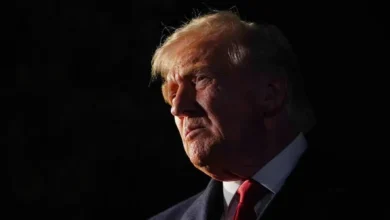
The Canine Question: Why Trump’s Aversion to Dogs Is More Than a Personal Quirk
In the grand theater of the American presidency, there are certain props and symbols that have become almost inseparable from the office itself. There is the resolute desk, the gravitas of Air Force One, and, for more than a century, the warm, fuzzy symbol of normalcy trotting across the White House lawn: the First Dog. From Franklin D. Roosevelt’s beloved Scottish Terrier, Fala, to Barack Obama’s Portuguese Water Dogs, Bo and Sunny, presidential pets have served as a sprawling, unbroken tradition. They are the great humanizers, softening the image of the world’s most powerful leader and projecting a sense of family, warmth, and relatable American life.
But what happens when a leader openly rejects this tradition?
Donald J. Trump was the first president in over 100 years to not have a dog in the White House, a historical footnote that, for many, became a surprisingly revealing window into his character, his political brand, and his fundamental break with the established norms of the presidency. While on the surface it seems trivial, the “canine question” surrounding Trump is more than just a matter of personal preference. It’s an exploration of symbolism, loyalty, and the deliberate construction of a political identity that has no room for “man’s best friend.”
A Deliberate Break with Tradition
It wasn’t an oversight. The absence of a First Pet during the Trump administration was a conscious choice, one Trump himself addressed on multiple occasions. At rallies, he would often frame the idea of getting a dog as a phony, political act. He told supporters it would be disingenuous for him to get a dog just for the optics, suggesting that other politicians did so for precisely that reason. “You do love your dogs, don’t you?” he’d say to cheering crowds. “I wouldn’t mind having one, honestly, but I don’t have any time… It’s a little phony, to me.”
In his own telling, his decision was a mark of authenticity. He was too busy, too focused on “Making America Great Again” to indulge in the charade of walking a dog on the South Lawn for a photo op. For his devoted base, this explanation landed perfectly. It was another example of Trump refusing to play the same old political games as his predecessors. He was a serious man for serious times, not a sentimentalist pandering for approval with a cute puppy.
Yet, for his critics and a vast swath of the dog-loving American public, his reasoning—and his general demeanor when discussing dogs—felt less like authenticity and more like a jarring disconnect. It wasn’t just that he didn’t have a dog; it was that he seemed to fundamentally misunderstand their role in the human experience.
The “Tough” Dog vs. The Pet
Trump’s rare moments of canine praise were almost exclusively reserved for dogs in a professional, tactical capacity. He famously lauded Conan, the Belgian Malinois military dog involved in the raid that killed ISIS leader Abu Bakr al-Baghdadi. He called Conan a “hero” and a “tough cookie,” awarding the dog a medal in a White House ceremony. This was a dog he could understand: a disciplined, effective weapon in the service of American strength.
This distinction is crucial. Trump’s admiration was for a “working” dog, an asset. It was not for a pet—a creature that offers unconditional love, demands vulnerability, and exists within a relationship that is emotional, not transactional. This worldview aligns perfectly with the Trump brand, which is built on strength, dominance, and a transactional approach to relationships. Loyalty, in his world, is a currency to be earned and repaid, not a simple, slobbery given. The messy, irrational, and unconditionally loving bond between a person and their pet simply doesn’t compute in that framework.
A Term of Ultimate Derision
Perhaps nothing is more revealing than Trump’s consistent use of the word “dog” as his go-to insult. It is his verbal signature, a term reserved for his most reviled enemies to signify ultimate failure and degradation.
He claimed Steve Bannon was “dumped like a dog by almost everyone.” He said journalist David Gregory was “fired like a dog.” He reveled that Qasem Soleimani “died like a dog.” The list goes on and on. In the Trump lexicon, to be a “dog” is to be pathetic, disloyal, and utterly defeated. It is not a term of endearment, but a mark of shame.
This repeated, venomous use of the word reveals a deeper perception. It suggests that he views dogs not as noble companions, but as base, subservient creatures. This stands in stark contrast to the cultural perception of dogs as symbols of loyalty, courage, and unconditional love. While many people might jokingly refer to themselves as being “in the doghouse,” Trump’s usage carries a weight of genuine contempt.
A Character Test for a Polarized Nation
Did his lack of a dog actually matter politically? The answer is as divided as the country itself.
For his opponents, it was a significant red flag, another piece of evidence in their larger portrait of a man lacking in empathy, warmth, and basic human connection. The old adage, “Never trust a person who doesn’t like dogs,” became a common refrain. His aversion was seen as a character flaw, a small but telling sign of a deeper emotional void.
For his supporters, it was a non-issue at best and a positive attribute at worst. They saw it as proof of his laser focus on the job, his refusal to engage in political theater, and his authentic rejection of Washington traditions. In their view, the media’s focus on such a trivial topic was just another example of “Trump Derangement Syndrome.”
Ultimately, the canine question serves as a perfect political Rorschach test. What one sees in Trump’s aversion to dogs says more about their own view of him than it does about the man himself. It is a debate not about pets, but about personality and the presidency. It highlights the profound schism in what Americans look for in a leader: Do we want a president who projects a comforting sense of normalcy and family, complete with a furry friend? Or do we want a disruptor who deliberately smashes those symbols, viewing them as relics of a “phony” political past?
Donald Trump’s answer was clear. And in making that choice, he gave us one of the clearest and most unusual lenses through which to understand his presidency and his enduring impact on American culture.


